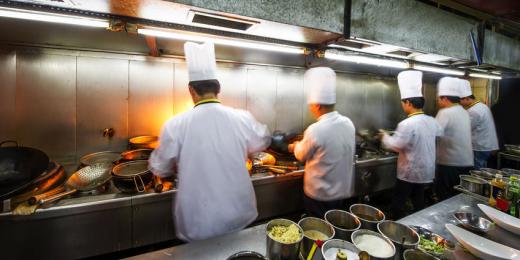Engineering and Hospitality Industries Struggling Because Of Immigration Rules

The fishing industry in the Western Isles of Scotland is the latest market sector to bemoan the UK Government’s Immigration policy. Would-be Tier 1 Sponsor Licence holders state that fishing boats are being left tied up because owners simply cannot recruit the crew needed to man them.
The problem stems from a ruling that fishing vessels working within the 12-mile limit of UK territorial waters must not employ crew from outside the European Union. Western Isles SNP MP Angus MacNeil has written to the Immigration Minister, Robert Goodwill, stating that it is extremely difficult to hire locals in an area suffering such sharp population decline, and the ability to hire Tier 2 (General) Visa applicants was crucial for the economic survival of the Outer Hebrides.
Many industries in the UK are suffering because they are unable to hire Tier 2 skilled workers. Many are turning to experienced Immigration lawyers to obtain the best advice on dealing with the problem. In this article, we examine the market sectors hit hardest by the continuous tightening of the Tier 2 Immigration route.
Engineering
According to new research published in Engineering UK in 2015, filling the demand for new engineering jobs will generate an additional £27 billion per year for the UK economy from 2022. The Royal Academy of Engineering estimates that the UK needs 100,000 science and engineering graduates a year, but only produces 90,000, many of whom choose other careers rather than engineering.
Despite the multitudes of jobs available, a whopping 65% of recruiters state that engineering positions are the hardest to fill. Speaking at a conference in 2013, former IChemE Chief Executive, Dr David Brown said that, “anti-Immigration hysteria should be resisted” or it would damage the ability to attract talent and firms into the UK.
Food and hospitality
In last weekend’s Sunday Times, the TV chef and restaurateur, Rick Stein stated that his restaurants in the Cornish town of Padstow rely heavily on Polish and Czech workers stating, “I don’t know why, but we’re not able to recruit enough local people to run the restaurants.”
According to the recent statistics, 26% of hospitality and food industry positions are filled by non-UK workers. And migrants are not just working in entry level positions, Figures show that migrants undertake 37% of all skilled roles (such as chefs) and 28% of all managerial positions. To offer a practical demonstration of the extent to which migrant workers occupy key managerial roles in the industry, there are currently almost 44,000 restaurants and catering managers born outside of the UK and over 91,000 chefs.
Migrant labourers from the EU also make up more than 30% of all workers in the manufacture of food products.
Foreign chefs are often needed by restaurants which specialise in non-EU dishes such as Thai, Vietnamese and Turkish food. For these businesses, recruiting staff from the nation in which the food comes from (and are therefore far more likely to be skilled in the particular methods and styles of cooking) can be almost impossible. Employers who hold a Sponsor Licence whose available position is not on the Shortage Occupation List, may not be able to hire a chef from outside the UK on a Tier 2 (General) Visa. This is because the skills threshold for obtaining a Tier 2 visa is NQF level 6 and the occupation of ‘chef’ does not appear on this list.
Hospitality and food industry managers must rely on receiving the best Immigration law advice available from a solicitor experienced in the points-based system, or else run the risk of not being able to employ the right staff for specialised chef positions.
New messaging from the Conservative Party Conference may signal further restrictions
Yesterday, Home Secretary Amber Rudd (who spent today defending herself against claims of racism), rattled business leaders further by suggesting that companies would have to list all of their foreign employees. This has been vilified by business leaders as a ‘naming and shaming’ exercise, which indicates to the world that the UK is closed for business when it comes to welcoming foreign skills.
She denied she had fallen into the same trap as ex-Labour Prime Minister Gordon Brown, who was accused of 'dog whistle' politics when he called for "British jobs for British workers", something he was heavily criticised by David Cameron for.
Many of the country’s best Immigration solicitors and business leaders disagree, with Acting Director General of the British Chambers of Commerce Adam Marshall suggesting that the government saw having a global workforce as "a badge of shame".
Concluding comments
There is no doubt that Britain is entering new and unchartered waters, where the focus seems to have swung to more inward-looking, nationalism and away from global, outward looking policies. Will this new direction assist the ‘ordinary, working-class people’ who Theresa May is determined to reach out to? Only time will tell. But one thing is certain. Industries who are already struggling to find qualified, suitably skilled workers will find it even harder to grow and expand their organisations if even tougher Immigration policies are enacted.
OTS Solicitors is one of the most respected Immigration law firms in London. By making an appointment with one of our Immigration solicitors, you can be assured of receiving some of the best legal advice available in the UK today. We will assist you with all aspects of applying for a Sponsor Licence and/or Tier 2 (General) Visa and Tier 2 (Intra-Company) Transfer) visa, supporting you throughout the process.
If you wish to discuss any of the points raised in this blog, please phone our London office on 0203 959 9123.


